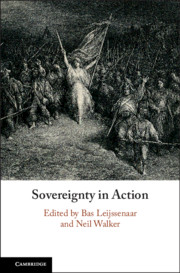Part II - History of Theory
Published online by Cambridge University Press: 07 July 2019
Summary
‘The king reigns but does not govern’. This formula, which according to Carl Schmitt was coined by Adolphe Thiers, a French liberal historian and politician, enemy of Bonapartism yet suppressor of the Paris Commune, has become today the most important formula in the study of liberalism. Michel Foucault and Giorgio Agamben both understand this formula as capturing something essential about liberalism as a form of governmentality that guides the conduct of individuals either in the absence, or beyond the reach, of the sovereign power and its legislation through normative and normalizing orders that escape democratic control. Although not discussed as such, this formula also underlies recent attempts by jurists and historians of political ideas such as Martin Loughlin and Richard Tuck to bolster the sovereignty of the state against new forms of governing without the state that emerge in neoliberalism. This chapter proposes a new reading of this formula by situating it on the terrain of constitutionalism, rather than on that of sovereignty. In so doing, it seeks to bring together in a meaningful exchange these two different critical approaches to neoliberalism, and the emerging debates they harbour. One debate is between those who advocate a Foucauldian and biopolitical and those who adopt an Agambenian and politico-theological analysis of neoliberal governmentality. The other is the one between advocates of a republican, constitutional approach to democracy and those who argue for the revival of popular sovereignty on the basis of new ‘democratic’ interpretations of Bodin and Hobbes.
Keywords
- Type
- Chapter
- Information
- Sovereignty in Action , pp. 113 - 226Publisher: Cambridge University PressPrint publication year: 2019

